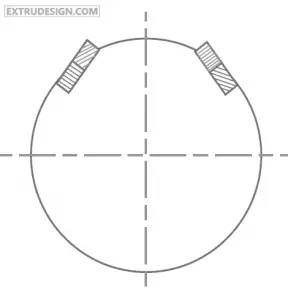Lets begin with the basic question😄.......


B.Saddle Keys:-
What is Machine ?
- A machine is a device, consisting of various elements arranged together, so as to perform the prescribed task to satisfy the human needs.
- Machine is capable of doing some useful work. It converts and transfers different forms of energy.
- Modern machines are complex systems that consist of structural elements, mechanisms and control components.
- INPUT ⟹ MACHINE ⟹ OUTPUT
- Ex. of Machine- I.C. Engine, Turbines, Compressors, C-clamp , Screw- Jack,etc.
Machine Elements:-
- Machine elements are basic mechanical parts
- Machine elements are assembled together to form what we call as complete machine.
- Its function may be of holding the components together, to transmit power or to give supports.
- Ex. Elements of Screw Jack:- Screw, Nut, Body, Handle
Some important Machine Elements:-
1] Shaft :- To transmit the
power
2] Key :- To transmit the
power from the shaft to other rotating elements
3] Couplings :- To connect
two shafts
4] Bearings :- To support
the shaft
5] Nut and Bolt:- To connect
two parts
Lets see one by one...
SHAFT:-
- It’s rotating machine of circular cross section which is used to transfer power.
- Transmission of power from one shaft to another takes place by mounting ‘gears, pulleys, crank, sprockets etc. on it.
- These members are mounted on the shaft by means of keys or splines.
- They are subjected to torque, bending moment, axial force.
- Sometimes, hollow shafts are used to reduce the weight.
Types of Shafts:-
A. Transmission
Shafts
B. Machine
Shafts
A. Transmission
Shafts :- Shaft which is used to transmit the power from source to the machine
absorbing power is called Transmission Shaft. Transmission shaft supports ‘
power transmission elements’ like pulleys, belts, sprockets, chains, gears,
clutches.
- Examples of transmission shaft:
Line Shaft and Counter Shaft
B. Machine Shafts:-
It is a short rotating shaft
which forms an integral part of the machine itself.
Ex.
Spindle Shaft :- A spindle is a rotating shaft with
a fixture for holding a tool or a workpiece.
Crankshaft:-
A crankshaft is a rotating shaft
which converts reciprocating motion of the pistons into rotational motion.
Crankshafts
are commonly used in internal combustion engines and consist of a series of
cranks and crankpins to which the connecting rods are attached.
1. An
axle looks a like shaft but it’s a non-rotating machine element which is used
to support rotating elements.
2. The main purpose of axles is
to transfer power to the rotating elements and to support the rotating machine
elements.
3. Axle is subjected to bending moment and axial
force but not torque as it’s not rotating

 |
| Car rear axle |
Key:-
- Key is a machine element used on the shafts to secure rotating elements by inserting it between shaft and hub of element and prevents relative motion between them. Rotating elements like- gears, pulleys, sprockets.
- The secondary function of the keys is to prevent relative movements in the axial direction of the shaft.
- Key is also used for transmitting the torque from shaft to rotating element or vice-versa.
- It’s having lower strength than shaft material to ensure that if at all there is failure the key should fail instead of shaft.
- Keyway is a slot or pocket in a shaft and hub of rotating element to insert a key.

Types of Keys:-
A. Sunk keys :- Sunk Key is that kind of key that is mount half a
side in hub of rotating element and half a side in shaft keyway. Most
widely used keys are sunk keys.
 |
| Woodruff Key |
 |
| Reactangular Key |
 |
| Parallel Key |
 |
| Gib- head key |
 |
| Square Key |
B.Saddle Keys:-
- It’s tapered key fits only in hub of rotating element.
- Saddled key doesn’t sink inside the shaft , hence it’s not a sunk key.
They have low torque transmitting power.
As it is outside the shaft, it doesn’t weaken the shaft.
C.Tangent Keys:-
- These are used in large heavy weight shafts.
- It transmits the torque only in one direction by means of compressive force alone. Two tangent keys are separated by 90 degree.
D. Feather Keys:- Keys
which allows some relative axial motion between hub and shaft but definitely
prevents relative rotational motion
between them.
Feather key is used when the hub
is required to slide along the shaft.
 |
| Feather Key which allows some axial motion. |
E. Splines:-
- The splines are keys made integral with the shaft
- It prevents relative rotational motion but permits relative axial motion.
- Splined shaft is used when forces to be transmitted are large in magnitude. They are used in automobile gear boxes and machine tool gear boxes.
| Spline and Gear Shaft |
to be continued.............











Looks like you took a lot of efforts.... Keep it up boy!!!
ReplyDeleteThanks. While writing any post I always keep in mind that readers should understand every point.
DeleteLot of thanks.
Thanks sir for the useful info.
ReplyDeleteThank u so much. Your comment means alot to me
DeleteThank u sir ,ur post is really benifitial for me.Please keep it up.
ReplyDelete